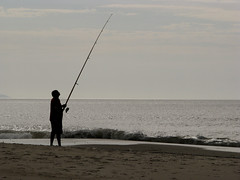Our family has had a wonderful weekend with family and friends back in Lubbock, Texas. Of the four or five times we’ve visited since moving to Oklahoma almost three years ago, this is the first time my wife has said “it doesn’t feel like home anymore.” It doesn’t feel like home to me either, although it is wonderful to be back in familiar places and among old friends. We’re Okies, and we’re proud of it. We’ve found Oklahoma to be our own “promised land,” and we’re still “staking our claim” there. It’s interesting how long it takes to process change and come to terms with a geographic move. The seasons of life change, but often our minds are slow to adapt.
Today at lunch, I had a wonderful conversation with one of my good friends now in his first year of law school at Texas Tech, and another friend who is a family practice doctor here in Lubbock. We were discussing the differences in the teaching approaches of medical school versus law school. Both of them agreed that a main focus of “professional schools” like law and medical schools is getting students to be able to teach themselves and become almost entirely self-directed in their learning. Professors are there to assess learning and enhance it with supplements, but the VAST majority of learning takes place independently, “in the textbook.” Amidst his four classes, my friend in law school reads about 100 pages per night, every night. Expectations are high, and NOTHING is “spoon fed.”

![]() photo credit: Dave Austria
photo credit: Dave Austria
This conversation got me thinking about K-12 education, of course, and how many students in many classrooms today have been conditioned to expect “spoon feeding” when it comes to formal learning contexts. It made me wonder the degree to which the goal of creating self-directed learners should NOT be limited only to professional, graduate school contexts, but included in ALL learning situations.
Dependent learners remain limited learners. Unbounded possibilities beckon to those who learn to fish for themselves in the ocean of ideas which is our world.
Technorati Tags:
learning, law, medical, school, education, self, directed, independent, dependent, reform, change
If you enjoyed this post and found it useful, subscribe to Wes’ free newsletter. Check out Wes’ video tutorial library, “Playing with Media.” Information about more ways to learn with Dr. Wesley Fryer are available on wesfryer.com/after.
On this day..
- Optimize Your Website by Enabling GZIP Compression – 2015
- View Kindle Notes on a Webpage – 2011
- HeyTell: Use Your iPhone or Android Phone like a Walkie Talkie #edapps – 2011
- 10 Ways to Write Better Blog Posts – 2011
- Include PBworks wiki pages as repeated header or footer content – 2010
- Protected and inactive organizational Twitter accounts, Digital Footprint Maintenance – 2010
- Link for Frontier PS Teachers – 2010
- Ohio Education Association gives bad advice on social networking – 2008
- Manage Twitter contacts with Twitter Karma – 2008
- Read to me, Sam! – 2007


Comments
4 responses to “Professional Schools and Self-Directed Learning”
So how to create self directed learners at the earlier levels of education. I hear you, loud and clear, as a college professor and from some material I have read, there is also a gendered effect in terms of who is going to be the more dependent learners. I would say though, that there is such pressure at such a young age for kids to ‘get it right’ that this translates into ‘just tell me what you want’ or my own favorite ‘ open your brain and download it into mine.’It infuriates me and now as a mother of two young ones who delight in ‘doing it themselves’ I wonder how to hold onto that sentiment. Recently I was in my parent-teacher meeting and was asked if I was concerned about my son’s (kindergarten) lack of progress with reading, his ‘academic advancement’. My sons have spent their early education years in waldorf schools where it is all student directed. I responded, ‘ the most important thing is his love of learning and holding onto his curiosity. He will read in his own time because he loves books and he wants to read, but no, I am not concerned about his schedule.’ His teacher was relieved because she too believes students should lead the way, but unfortunately, I think many times she finds herself in just the opposite situation. So perhaps if we want self directed learners and thinkers, we need less controlling parents….
Kristi: Your comments remind me of some of the things I’ve read by John Holt. One of the greatest dangers in sending our children to public or private schools is that their natural curiosity and love of learning will be quashed and stolen from them by a system which generally values conformity and homogeneity over creativity and individual expression. I agree that the CONTROL issue is at the heart of things, both for schools and for parents. Glad you and your child’s teacher are taking a reasonable approach toward school performance timelines.
On my blog http://tsakshaug-nonesense.blogspot.com/ I have a couple of posts regarding PBL that may fit in with this discussion. Questioning how it is done and how to evaluate
How do you think that could be accomplished?
I think that the reason large numbers of students find school so boring is because it is so dependent. There’s no interest in knowing that you just have to sit quietly for a few moments before the practically-rhetorical question the teacher asked is patiently answered by the teacher.